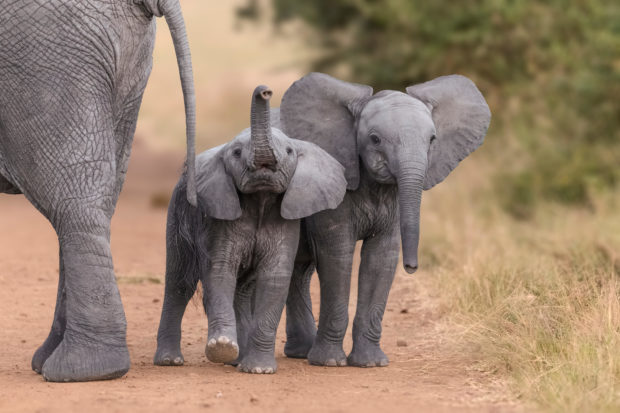
Zimbabwe’s repeated capture and export of infant and juvenile elephant calves has sparked global condemnation because of the horrific conditions under which these young elephants are kept. Photo by Alamy
It is the worst kind of wildlife abuse, and it is happening right now – again – in Zimbabwe, where 35 baby elephants have been torn away from their mothers in the wild and are awaiting export to zoos in China. According to The Times of London, the calves, some as young as two years old, are being held in pens in Hwange National Park while travel crates are prepared and documents finalized for their 7,000-mile transport.
This is the fourth time since 2012 that Zimbabwe has captured and exported baby elephants to Chinese zoos — a total of 108 elephants — despite opposition from other African countries, elephant experts, and non-governmental organizations, including the Humane Society of the United States and Humane Society International. In October 2017, HSI obtained exclusive footage of 14 young elephants awaiting export to Chinese zoos, after their capture from Hwange National Park by the Zimbabwe Parks and Wildlife Management Authority. The footage showed the calves being beaten and kicked as they were being sedated and taken away to the park’s holding pens. In 2016, Zimbabwe exported 30 baby elephants to Chinese zoos. Several juvenile elephants in earlier shipments had died during transit or after arrival. It was shocking to see photos of the few surviving baby elephants, standing alone in dark, barren cells after their arrival in China.
The exports are even more disturbing given that China and Zimbabwe have in the past failed to conform with requirements under the Convention on International Trade in Endangered Species (CITES). In 2016, when China sought to import 30 elephants from Zimbabwe, a team of Zimbabwean inspectors who traveled to China to assess the facilities the elephants would be housed in found them inadequate. The inspectors reported that most of the zoos showed signs of poor treatment of the animals and recommended the elephants remain in Zimbabwe until appropriate holding facilities in China were completed and assessed for compliance. Despite this recommendation, the elephants were exported to China without such reforms being implemented.
Zimbabwe’s repeated capture and export of infant and juvenile elephant calves has sparked global condemnation because of the horrific conditions under which these young elephants are kept. Elephant expert Dr Joyce Poole — widely regarded as the world’s leading elephant communication specialist — has described the activities as “tragic and morally reprehensible”. The African Elephant Coalition (AEC), a coalition of 32 African elephant range states, has also repeatedly spoken out against the capture and trade of wild baby elephants for captivity. HSI co-led a report on challenges to the trade in wild-caught African elephants with the AEC, and our staff is now attending the AEC’s summit in Kenya where we expect to hear strong objections raised over this most recent and brutal capture of wild baby elephants.
In defense of the practice, Zimbabwe’s Minister of the Environment Oppah Muchinguri-Kashiri has said that her country intends to increase the rate and range of wildlife exports as part of a scheme to raise funds for conservation. “The Chinese have inquired about more elephants, baboons, hyenas, lions, among others, and we will sell them more without hesitation. We are not going to apologize to anyone,” she said.
Unfortunately, our appeals to the Zimbabwe government to stop these exports have fallen on deaf ears. In January 2018, HSI/Africa and 33 partners submitted a letter to Zimbabwe’s new president, Emmerson Mnangagwa, pleading for a halt to the horrific abuse and practice of capturing elephants from the wild for captivity. We did this after learning of his statement that called for a review of Zimbabwe’s conservation decisions following recent elephant exports. With this most recent capture of the baby elephants, little appears to have changed in how Zimbabwe handles its precious wildlife.
African elephants are currently listed as a threatened species with less than 500,000 remaining in the wild, and the global community is increasingly in agreement on the need to conserve these animals. Keeping elephants and other wildlife alive is also key to economic progress in so many African nations, because millions of tourists trek to these countries to see them there. By ripping baby elephants from their mothers and sending them to lives diminished by captivity in zoos overseas, Zimbabwe is setting itself on a path that will not only decimate its wildlife but will also further compromise its standing in the eyes of the world.
The post Zimbabwe rips 35 baby elephants from their mothers for export to Chinese zoos appeared first on A Humane World.
Enviroshop is maintained by dedicated NetSys Interactive Inc. owners & employees who generously contribute their time to maintenance & editing, web design, custom programming, & website hosting for Enviroshop.
